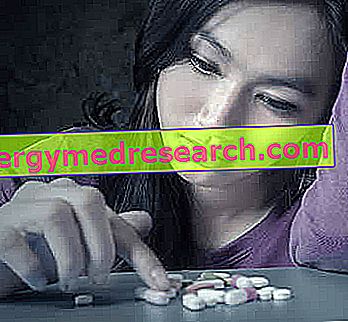Definition
In the medical field, addiction is used to indicate a particular condition in which an individual suffering from the absolute need to assume a certain substance - such as, for example, drugs or narcotic substances - or to adopt certain behaviors, as happens, for example, in the case of gambling addiction.

It is still not entirely clear what the mechanisms behind the dependence are; however, it is believed that in the etiology of this pathological condition there may be the involvement of neurotransmitters fundamental to our central nervous system, such as, for example, dopamine and serotonin.
Types of Addiction
There are many types of addiction known today. They can develop both against certain substances and against certain behaviors or attitudes.
First of all, it should be pointed out that the dependence - regardless of its object - can appear in two different forms, sometimes present simultaneously: physical dependence and psychic dependence.
Physical dependence
Physical dependence is characterized by a real physical need to take the substance or adopt a certain behavior, so as to allow a normal functioning of the organism. In fact, if this need is not met, the patient experiences the so-called withdrawal syndrome, characterized by decidedly unpleasant symptoms.
Psychic dependence
Psychic dependence is characterized by an irrepressible desire to try again the effects (considered pleasant) of the substance or of the behavior on which one depends.
Examples of addiction
That said, among the different types of addiction that can arise in an individual, we remember:
- Drug addiction;
- Dependence on drugs;
- Alcohol addiction (alcoholism);
- Tobacco addiction (smoking);
- Food addiction;
- Sex addiction;
- Gambling addiction;
- Shopping addiction (compulsive shopping);
- Internet addiction.
As can be seen, the types of dependence that can be established are quite numerous. Certainly, among the best known are addictions (which include drug addiction, alcohol and tobacco addiction) and gambling addiction.
Withdrawal syndrome
As mentioned, the withdrawal syndrome is the phenomenon that appears in individuals who suffer from an addiction when they cannot satisfy it.
The withdrawal syndrome is characterized by the appearance of both physical and psychological symptoms. The type and intensity of these symptoms depend on the type of addiction the patient suffers from and its severity.
However, among the main physical symptoms induced by the various types of known addictions, we recall:
- Nausea and vomit;
- Diarrhea;
- Asthenia;
- Insomnia or hypersomnia;
- bradycardia;
- Increased appetite;
- Headache;
- Muscle pains;
- Pupil dilation;
- Hyperhidrosis;
- runny nose;
- Seizure crisis.
Among the main psychological symptoms that occur during withdrawal symptoms, instead, we find:
- Mood changes;
- Agitation and restlessness;
- Anger and irritability;
- Frustration;
- dysphoria;
- States of anxiety;
- Difficulty concentrating.
Diagnosis
The diagnosis of substance or behavioral dependence is fundamental and should be carried out - as far as possible - in a timely manner, to intervene in a short time and prevent complications and consequences from potentially dramatic aspects (just think of the drug overdose deaths) 'abuse, such as heroin).
Generally, the doctor carries out an evaluation of the symptoms and behaviors that the patient manifests, and elaborates a diagnosis based on the indications provided by the DSM, ie the diagnostic and statistical manual of mental disorders (from the English "Diagnostic and Statistical Manual of Mental Disorder ").
Unfortunately, very often, individuals with addictions do not even realize that they suffer from it (or do not want to admit it); for this reason, they do not ask for help and believe that they have no problem or at least think they are able to control their own addiction (which, in most cases, they do not consider such).
Treatment
The treatment of addiction is a long and often difficult process, which can vary depending on the nature of the addiction, its severity and the will of the individual himself to get rid of it (in fact, it is very important that the patient recognizes that he is in a pathological condition, which as such must be treated).
In general, we can state that to treat this disorder the therapeutic approach normally undertaken is of a multidisciplinary nature, and may require both pharmacological and behavioral and psychological interventions.
Certainly, the psychological support - both individual and group - plays a fundamental role in the healing of the individual, and is aimed at extinguishing that irrepressible desire - typical of psychic dependence - that drives the subject to take a certain substance or to adopt certain behaviors. Equally fundamental is the help coming from the relatives of the dependent subject. The contribution of pharmacological therapy, whose purpose is to counteract the physical need that drives the individual to satisfy his addiction, is no less important.
Drugs, therefore, can be useful to prevent withdrawal symptoms and to promote or maintain abstinence from the addiction of which one suffers (as happens, for example, in the case of addiction therapy for opioid addiction, in which to already detoxified patients are administered naltrexone in order to maintain cessation).



